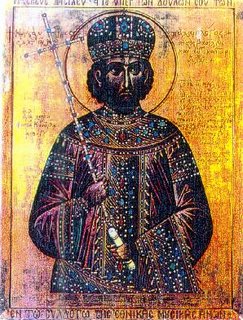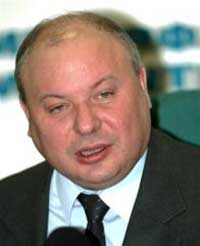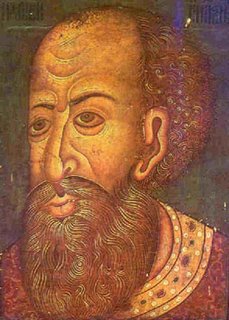 The fall of Constantinople in May 1453 – an event that even a pro-Turk like myself cannot help remembering as the Pope visits the Blue Mosque – destroyed the Second Rome. Two of the previous candidates for the Third Rome, Serbia and Bulgaria, had been defeated before. That left Muscovy, soon to be Russia, as the only possible heir to the two Roman empires.
The fall of Constantinople in May 1453 – an event that even a pro-Turk like myself cannot help remembering as the Pope visits the Blue Mosque – destroyed the Second Rome. Two of the previous candidates for the Third Rome, Serbia and Bulgaria, had been defeated before. That left Muscovy, soon to be Russia, as the only possible heir to the two Roman empires.This claim was strengthened by the fact that Ivan III (the Great), Grand Duke of Muscovy, the first to style himself as the Grand Duke of All the Russias, had married the niece of the last Byzantine Emperor, Sophia Palaelogue.
The idea, as so many others, had been brought to Russia from the no longer existent Balkan Orthodox kingdoms by Cyprian, a Bulgarian priest who became Metropolitan of Moscow in 1381. But it was finally crystallized by the monk Filofei in a letter written to Ivan’s son, Grand Duke Vasili III of All the Russias in 1510:
Two Romes have fallen. There stands the Third Rome. There will be no fourth.And so a great myth was born: Russia’s and the Orthodox Church’s missionary, God-bearing role. Together with the strong and not always justified sense of victimhood (all the Orthodox peoples, particularly the Slav ones, gave as good as they got throughout history) this has caused a great deal of trouble in Eastern and South-Eastern Europe.
There is, however, another aspect to Byzantine history, one covered at length by Procopius and Gibbon: the labyrinthine intrigue laced by extensive usage of poison when other methods had been exhausted. For obvious reasons, it is this aspect that has been pre-eminent in my mind in the last few days.
There seems to be something desperately wrong with events as they have unfolded with Russia. On the one hand there have been attempts to create an agreement with the European Union that have, for the moment, foundered on the Russian government’s traditional inability to negotiate without trying to bully everyone who gets in the way. Even relations with Ukraine could be settled in some other manner but President Putin seems unable to understand that it is now an independent country, which does not want to be part of his single economic and security space. The same applies to Georgia.
Nor is it a particularly sensible idea to suspend import of food from Poland and threaten to suspend it from the whole of EU when Romania and Bulgaria join on January 1, 2007 because of allegedly low hygiene standards. They are almost certainly low but nobody who has ever been on a Russian food market outside the tourist areas can help laughing at the Russian government’s supposed concern.
 Added to which there have been the unfortunate poisonings. First, Alexander Litvinenko, the former KGB and FSB officer who had written about the alleged involvement of the FSB in the explosions of the apartment blocks that served as a pretext for the renewal of the ferocious war in Chechnya and propelled Putin, until then a barely known apparatchik, to the presidency.
Added to which there have been the unfortunate poisonings. First, Alexander Litvinenko, the former KGB and FSB officer who had written about the alleged involvement of the FSB in the explosions of the apartment blocks that served as a pretext for the renewal of the ferocious war in Chechnya and propelled Putin, until then a barely known apparatchik, to the presidency.Now we have news of an apparent attempt to poison Yegor Gaidar, former Prime Minister under Yeltsin, architect of the semi-successful development of Russia into a democratic, capitalist state and, more recently, the Director of a free-market think-tank in Moscow, the Institute of Economic Transition. Gaidar was taken ill on a visit to Ireland and has been in hospital ever since, having spent three hours unconscious. The first suggestion that it was food poisoning has remained unproven and the doctors are puzzled.
 Why Gaidar? That is the question most of us asking. Litvinenko’s murder is, at least, comprehensible. In the first place he was “one of us” and turned to the enemy, providing it with information. The Cheka and its many successors, most recently the FSB, have always made it clear that people such as Litvinenko were high on the list of those they would “get” if for no other reason but to teach the others a lesson.
Why Gaidar? That is the question most of us asking. Litvinenko’s murder is, at least, comprehensible. In the first place he was “one of us” and turned to the enemy, providing it with information. The Cheka and its many successors, most recently the FSB, have always made it clear that people such as Litvinenko were high on the list of those they would “get” if for no other reason but to teach the others a lesson.Besides, Litvinenko produced some very valuable details in his account of those explosions. If, on top of that, he really was investigating Anna Politkovskaya’s murder (though what he could do from London is a mystery) then he would be seen as a serious threat. So, why not get rid of him and in the most painful way imaginable? That’ll learn him and anybody else who might consider following his example.
Gaidar, however, had never been in the KGB but was and is an economist. There may be some settling of old debts going on but he has not really been all that prominent for some time. Even his criticisms of Putin have been muted and rarely reported, unlike those of Andreir Illarionov, for instance. The latter, until a few months ago nominally Putin’s adviser, had better watch his step. There are a couple of young children there, too.
It may be that the attempt on Gaidar, if that is what it was, happened precisely because of his relative unimportance. In Russia they know who he is and the two poisonings could be seen as a threat: “And don’t think you can escape us by going abroad, either.”
It could be sheer incompetence, as well. After all, the amount of radiation left behind by the Russian assassination team does not argue highly professional behaviour. One must not forget that the Russian secret service is no more efficient than anybody else’s, just nastier.
The order for Litvinenko’s murder may have been given some time ago and they caught up with him at an inconvenient moment but as the order had not been rescinded, the case went marching on.
The Guardian maintains that it has learnt from some British intelligence sources (who dem?) that a “rogue element” in the FSB was probably responsible for Litvinenko’s murder as Putin’s government can be exonerated. Myself, I wouldn’t go as far as that. How can one possibly exonerate Putin’s government? Besides, that is simply rephrasing the question: which rogue elements and why? As for the difficulties of acquiring Polonium-210, that is tosh. It seems to have industrial uses and is, therefore, available in various ways. Besides, it is some time since we could have said with any certainty that Russian nuclear laboratories were so secure that only a few numbered personnel had access to them.
For all of that, the theory that the murder and the possible attempt were carried out by the FSB is not to be discarded completely. It is possible that the disintegration of Russian society where politicians, bankers and businessmen are routinely murdered (and that ignores the killing of Politkovskaya, which must have been ordered from on high), where the first deputy prosecutor-general gives it as his opinion that the equivalent of $240 billion is given in bribes to officials a year (two and a half times the state’s total revenues) may well have prompted some high-ranking officers to take action that would undermine Vladimir Putin, whom they may well see as responsible for the sorry state of affairs.
Or the boot is on the other foot. Putin is not supposed to stand in the 2008 presidential elections and cannot do so unless there is a change in the constitution. He has said several times that this will not happen. But what if in the course of 2007 the country enters a severe crisis, to do with the economy or social matters or law and order? Would the people of Russia not then demand that the constitution be changed and the strong boss (khozyain) would go on being the president?
 After all, that is, mutatis mutandis, what Vasili III’s son, Ivan IV (the Terrible), did in 1564/5. Incidentally, the behaviour of the Russian army in Chechnya throughout the conflict reminds one of the behaviour of Ivan’s army in Kazan and Greater Novgorod, not to mention the behaviour of the oprichniki, the praetorian guard or early version of secret police across the whole of Russia.
After all, that is, mutatis mutandis, what Vasili III’s son, Ivan IV (the Terrible), did in 1564/5. Incidentally, the behaviour of the Russian army in Chechnya throughout the conflict reminds one of the behaviour of Ivan’s army in Kazan and Greater Novgorod, not to mention the behaviour of the oprichniki, the praetorian guard or early version of secret police across the whole of Russia.The question is, do we still see Russia as a foremost ally in the fight against terror and a useful partner in the development of energy policy?
